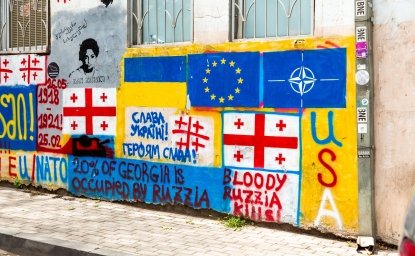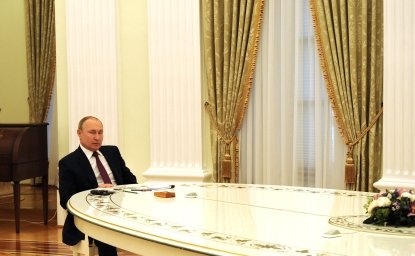
A blog of the Kennan Institute
In their views of Russia’s president’s activities or the state of affairs in the country, Russian youth hardly stand out from other age groups. However, support for the war and for Moscow’s isolationist course is noticeably lower among young people than the population average. Among young people there are more people open to peace negotiations and to restoring ties with the West.
As a result of their media diet and generally Westernized attitudes, people between the ages of 18 and 24 have traditionally given Moscow’s propaganda chiefs headaches. With the war against Ukraine in its third year, the authorities cannot fail to see that Russia’s young are not quite falling into line with the rest of the population.
This may be the reason why the Russian authorities are stepping up pressure to convert the people in their teens and twenties to Moscow’s official nationalist and militaristic creed. Since the full-scale invasion of Ukraine, the Russian state has created and supported various youth organizations modeled on Soviet or other totalitarian prototypes and mandated that all school and college students attend classes of patriotic education.
Lead-up to the Present Situation
A brief recent history of the government catching up with the country’s younger generations starts in 2021, which saw a major wave of protests throughout the entire country. That was the winter when the late opposition leader Alexei Navalny returned to Moscow to an almost certain arrest after spending a few months in Germany. In Berlin and in the south of Germany Navalny was undergoing treatment and rehabilitation after an attempted poisoning in the Siberian city of Tomsk in August a year earlier.
After Navalny’s arrest, his team released a documentary, Putin’s Palace. History of World's Largest Bribe. The film suggested that an enormous residence near the town of Gelendzhik in Krasnodar Krai was built for Putin by his cronies at the cost of over 100 billion rubles (around $1.35 billion). The authors, Navalny among them, referred to the palace as “the largest bribe in history.” At the time, Putin denied that he or his family had ever owned the palace and dismissed the investigation. Arkady Rotenberg, a businessman and a close associate of Putin, later claimed ownership of the property.
Despite Russia’s tightly controlled media environment, the upheaval caused by Navalny’s arrest and the film’s widespread viewership (reaching 100 million views by the end of January 2021) struck a significant blow to Putin. A January 2021 Levada Center poll showed that only half of people aged 18 to 24 approved of Putin’s performance. In a dictator’s world, a 51 percent approval rating is a low number. Since January 2020, the level of approval of the Russian president in this group has fallen by a quarter.
The Kremlin’s Damage Control
The Kremlin administration has been on a damage control mission ever since that low moment. It passed laws, increased the level of repression, declared Navalny’s organization, the Anti-Corruption Foundation (ACF), extremist and terrorist, and prosecuted almost every single member it could lay its hands on. According to the Russian independent media platform Kholod, fifty-three criminal cases were brought against the ACF and its members.
The increased number of criminal cases against all manner of oppositionists and effective war censorship did get the message across. The most recent numbers, released last month, show that 82 percent of respondents between the ages of 18 and 24 approve of Putin’s activities as president. In this age group, 72 percent of those polled said they thought that the country was on the right course. These numbers are not that different from those found in all other age groups.
Fear and repression work, but up to a point. In answering the question, would they reverse the decision to go to war if it were possible to go back in time? 49 percent of those polled by the Levada Center and 55 percent of those approached by Russian Field answered yes. The population’s average for this answer is 34–37 percent.
The youngest group has the largest share of those who would prefer Russia and Ukraine to get to the negotiating table: 62 percent of the youngest respondents according to Levada and 70 percent according to Russian Field would want negotiations. Among the oldest group, these numbers are 44 percent and 40 percent, respectively.
The share of those whose environment is dominated by supporters of the war is significantly lower among the young (37 percent vs. 53 percent on average for the sample), and the share of those who have a favorable attitude toward the EU and the United States at present is higher (32–33 percent vs. 18–19 percent on average).
The Kremlin’s Radical Notion of “Patriotism” Does Not Align with Young People’s Ideas
This situation is a source of concern for the authorities. School programs like “The ABCs of Important Matters,” aimed at “strengthening traditional Russian spiritual and moral values,” as well as organizations such as Youth Army (Yunarmiya) and Movement of the First (Dvizhenie Pervykh), along with various military-patriotic groups, are all engaged in campaigns focused on further indoctrinating teenagers with militaristic and state-centric patriotism.
The above-mentioned “youth deviation” in views on war and isolationist policies does not mean that young Russians are unpatriotic. According to a joint study by the Chicago Council on Global Affairs and Levada Center, eight in ten young Russians (82 percent) say they are very (65 percent) or somewhat (17 percent) proud to be Russian citizens, while only a few say they are not very or not at all proud (7 percent). For comparison, in the United States, according to a Gallup poll conducted last year, 72 percent of 18- to 34-year-olds reported being proud to be Americans to varying degrees.
Russian youth does not show any signs of radicalism. Younger Russians dislike being lectured on patriotism and are more likely than other age groups to express independent opinions. Generally, they are risk-averse and, as observed, patriotic. The paradox lies in the fact that the Kremlin’s political managers have a radical idea of patriotism that does not align with the thinking of the country’s young people. The militaristic and isolationist shift of “military Putinism” fails to resonate with the youth, as noted in the analysis by the expert platform Re: Russia.
The opinions expressed in this article are those solely of the author and do not reflect the views of the Kennan Institute
Author

Editor-at-Large, Meduza

Kennan Institute
The Kennan Institute is the premier US center for advanced research on Eurasia and the oldest and largest regional program at the Woodrow Wilson International Center for Scholars. The Kennan Institute is committed to improving American understanding of Russia, Ukraine, Central Asia, the South Caucasus, and the surrounding region though research and exchange. Read more

Explore More in The Russia File
Browse The Russia File
Beyond the “Good Russian” – Rethinking Exile and Engagement

The Kremlin’s War Bubble and Its Hidden Vulnerabilities

Russian Media in Exile Finds Purpose and Global Relevance

